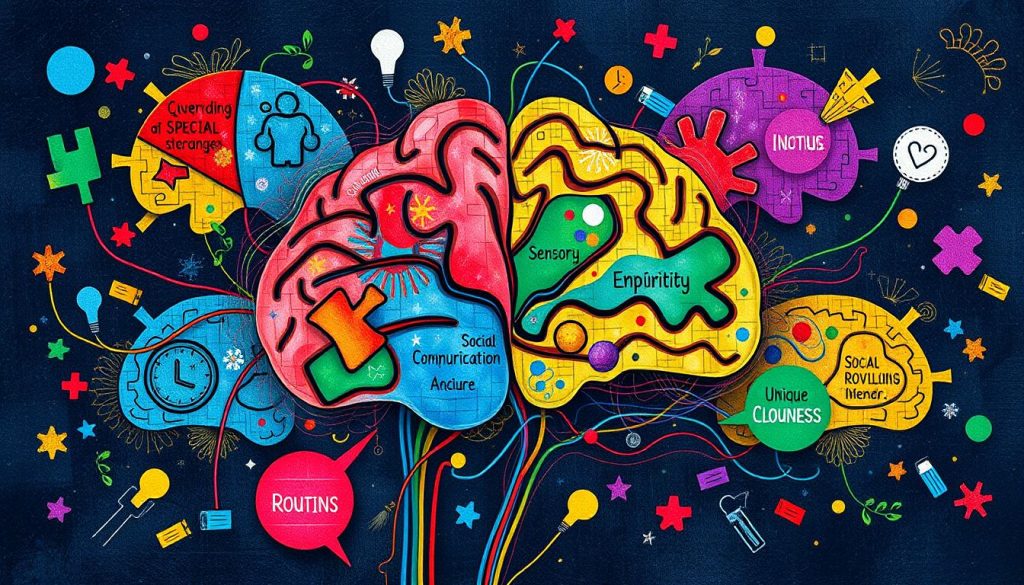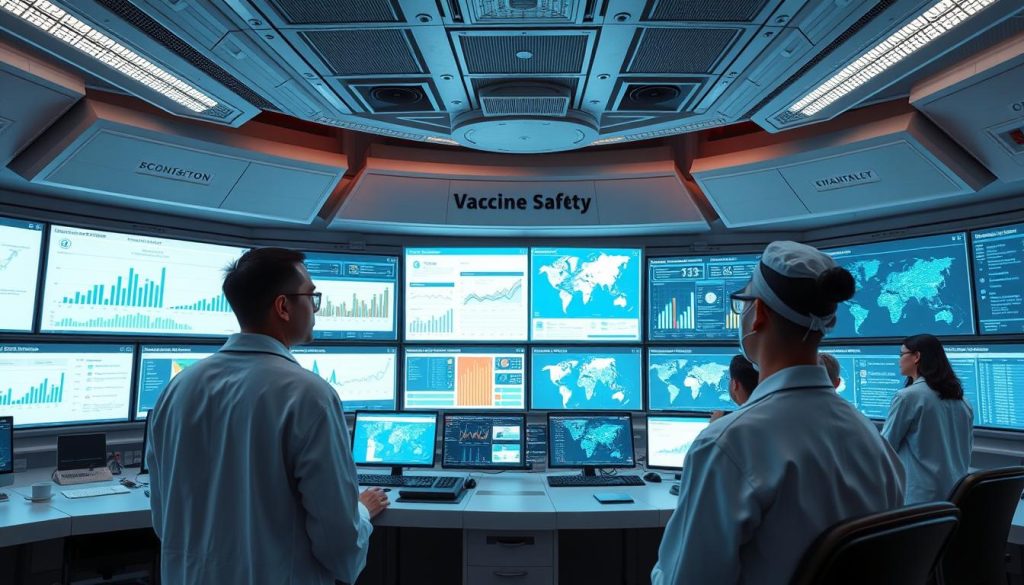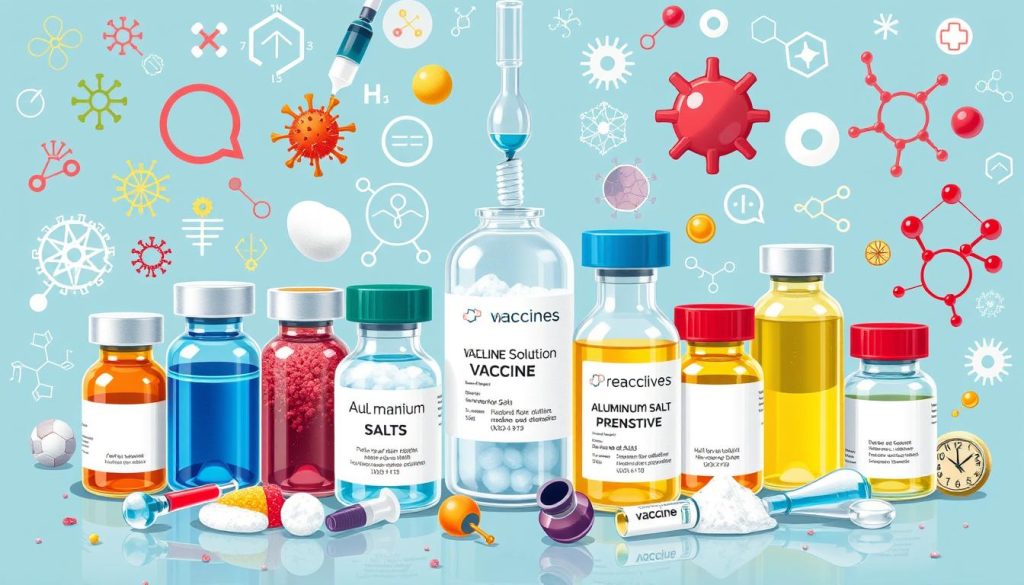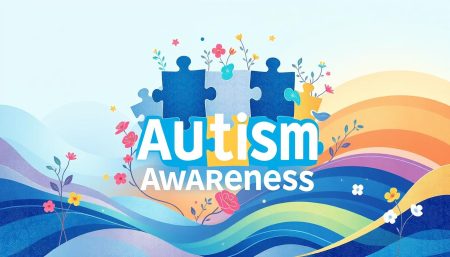The debate over whether vaccines cause autism has grown. Parents need to know the truth about vaccines and autism. This article will look into the vaccine safety issue and its link to autism spectrum disorder.
We’ll check out the science, tackle common worries, and share facts on vaccine safety from top medical experts. Knowing the truth about vaccines and autism helps parents make better health choices for their kids.
We’ll start with the beginnings of this debate, look at big studies, and find out what really causes autism. Our aim is to give you solid, trustworthy info. This way, you can feel sure about your kids’ vaccinations.
Understanding the Vaccine-Autism Controversy Origins
The debate over vaccines and autism started in the late 1990s. It has been a major issue ever after, affecting public health. This debate has also fueled the anti-vaccination movement and led to many false claims about vaccine safety.
The Wakefield Study and Its Retraction
In 1998, Dr. Andrew Wakefield published a study in The Lancet. He suggested a link between the measles, mumps, and rubella (MMR) vaccine and autism. This study, based on just 12 children, caused fear among parents and led to fewer vaccinations.
Soon, the scientific community doubted Wakefield’s research. In 2010, The Lancet fully retracted the paper because of ethical issues and faked data. Wakefield lost his medical license, but the damage was already done.
Media Impact on Public Perception
Media coverage of the Wakefield study made it even bigger. It gave equal attention to his claims and the scientific consensus. This false balance helped spread misinformation and grew the anti-vaccination movement.
Timeline of the Controversy
Here are some key events in the vaccine-autism controversy:
- 1998: Wakefield study published
- 2004: Most co-authors retract support for the study
- 2010: The Lancet fully retracts the paper
- 2011: British Medical Journal declares Wakefield’s work “an elaborate fraud”
- 2014-2015: Measles outbreaks in unvaccinated communities
Despite strong scientific evidence proving no link between vaccines and autism, the controversy continues. It shows how false claims can harm public health for a long time.
Scientific Evidence: Do Vaccines Cause Autism?
Many studies have looked into if vaccines cause autism. Scientists have done lots of research to see if shots affect autism in kids.
A big study in 2015 looked at over 95,000 kids. It found no link between the MMR vaccine and autism. This study is part of the growing evidence that vaccines are safe.

The Centers for Disease Control and Prevention (CDC) says vaccines don’t cause autism. They say it’s key to follow the recommended vaccination schedule to keep kids safe from serious diseases.
Now, let’s see what major studies found:
| Study | Participants | Key Finding |
|---|---|---|
| Danish Cohort Study (2019) | 657,461 children | No increased autism risk in vaccinated children |
| CDC Vaccine Safety Datalink (2013) | 256 children with ASD | No link between vaccine antigens and autism |
| Japanese MMR Study (2005) | 31,426 children | Autism rates increased after MMR vaccine withdrawal |
These studies all agree: vaccines don’t cause autism. The science shows that vaccines are safe and vital for keeping everyone healthy.
The Science Behind How Vaccines Work
Vaccines are key to keeping us safe from harmful diseases. They are vital for protecting children through immunization programs.
Immune System Response to Vaccines
Vaccines teach our immune system to fight off specific germs. They contain weakened or dead viruses or bacteria. When we get a vaccine, our body makes antibodies to fight the real disease.
Vaccine Development and Safety Testing
Creating safe vaccines is a long process. Scientists first study the disease and its germs. They then develop a vaccine in labs and test it on animals.
If it’s safe and works, human trials start. Only after passing all tests can a vaccine be approved for use in childhood immunization programs.
Different Types of Vaccines Explained
There are several types of vaccines:
- Live-attenuated: Use weakened germs
- Inactivated: Contain killed germs
- Subunit: Use parts of germs
- Toxoid: Use a toxin made by the germ
Each type works differently but all aim to protect public health by preventing dangerous diseases.
Understanding vaccine science shows why they’re essential for our health. It highlights the care taken in developing safe, effective vaccines for our communities.
Understanding Autism Spectrum Disorder (ASD)
Autism spectrum disorder (ASD) is a complex condition that affects how people interact and behave. It’s a big topic in public health, focusing on childhood immunization and early help.

ASD symptoms vary a lot. Some people might struggle with eye contact or understanding social cues. Others may have repetitive behaviors or intense interests in certain topics. These signs often show up in early childhood, sometimes later.
Doctors diagnose ASD by watching behavior and development. They look for signs like:
- Delayed language skills
- Difficulty with back-and-forth conversation
- Unusual reactions to sensory input
- Rigid routines or behaviors
The causes of autism spectrum disorder are not fully known. Research points to a mix of genetic and environmental factors. But, studies have found no link between childhood immunization and ASD.
Early diagnosis and help can greatly improve life for those with ASD. This shows why regular developmental screenings are key in pediatric care. By understanding ASD better, we can build more inclusive communities and support systems for those affected.
Debunking Common Myths About Vaccine Safety
Vaccine safety is a key focus in medical science. Despite lots of research, myths about vaccines keep popping up. Let’s look at some common misconceptions and share the real facts.
Mercury and Thimerosal Facts
Many people are concerned about mercury in vaccines. But, most vaccines don’t have mercury. Thimerosal, a mercury-based preservative, was taken out of childhood vaccines in 2001. Now, it’s only in some flu shots. Research has shown no link between thimerosal and autism.
Multiple Vaccines and Immune System Load
Some worry that too many vaccines can overwhelm a child’s immune system. But, our immune systems deal with many antigens every day. Vaccines introduce a very small part of what we naturally meet. The immune system can handle the antigens in multiple vaccines.
Addressing Concerns About Vaccine Ingredients
Vaccine ingredients might sound scary, but they’re safe in the amounts used. Let’s explore some common ingredients and their roles:
| Ingredient | Purpose | Safety Information |
|---|---|---|
| Aluminum | Boosts immune response | Less aluminum than in breast milk or formula |
| Formaldehyde | Inactivates viruses | Body produces more naturally than in vaccines |
| Gelatin | Stabilizes live vaccines | Same as in many foods, rare allergic reactions possible |
Knowing these facts helps clear up myths about vaccine side effects. Vaccines go through strict testing to make sure they’re safe before they’re approved. The good they do is much more than the small risks.
Large-Scale Studies on Vaccine Safety
Many studies have looked into vaccine safety and its role in public health. These studies give us important information about how vaccines affect our health.
A study in the New England Journal of Medicine looked at over 500,000 kids. It found no connection between vaccines and autism. This study showed how important it is to keep vaccines safe for everyone’s health.

The Centers for Disease Control and Prevention (CDC) did a big study on over 1,000 kids. It also found that vaccines don’t raise the risk of autism spectrum disorders.
The Danish Cohort Study followed more than 650,000 kids. It found no higher risk of autism in kids who got vaccinated compared to those who didn’t.
| Study | Participants | Key Findings |
|---|---|---|
| New England Journal of Medicine | 500,000+ | No link between vaccines and autism |
| CDC Investigation | 1,000+ | No increased autism risk from vaccines |
| Danish Cohort Study | 650,000+ | No higher autism rates in vaccinated children |
These big studies all agree: vaccines are safe for kids. They show that vaccines are key to keeping us healthy without raising the risk of autism.
The Role of Genetics in Autism Development
Genetics is very important in autism spectrum disorder. Scientists have made big steps in understanding how genes affect ASD. This knowledge helps shape public health policies and debunk false claims about autism causes.
Twin Studies and Hereditary Factors
Twin studies give us important insights into autism’s genetic roots. If one identical twin has ASD, the other twin is more likely to have it too. This shows a strong genetic link. Family studies also show that autism often runs in families, pointing to hereditary factors.
| Twin Type | Autism Concordance Rate |
|---|---|
| Identical Twins | 60-90% |
| Fraternal Twins | 0-30% |
Environmental Triggers Research
While genes are important, they’re not the only factor. Scientists are looking into how environmental factors might trigger autism in people with genetic risk. These triggers could include air pollution or certain medications during pregnancy. This research helps us understand the complex nature of autism spectrum disorder.
Understanding both genetic and environmental factors is key to advancing autism research. It guides public health strategies and helps counter false claims about autism causes. As we learn more, we can develop better ways to support people with ASD and their families.
Vaccine Safety Monitoring Systems

Vaccine safety is a key focus in public health. To keep people safe, strong monitoring systems are set up. These systems watch and analyze data to spot any vaccine side effects.
The Vaccine Adverse Event Reporting System (VAERS) is vital for safety. It lets doctors and the public report any bad reactions after a vaccine. This system alerts us to rare or unexpected side effects that might not show up in tests.
The Vaccine Safety Datalink (VSD) is another important part. It’s a network of health groups that share data for big studies. By looking at millions of health records, the VSD can fast check safety concerns and share important info on how well vaccines work.
- VAERS: Open reporting system for anyone to report adverse events
- VSD: Collaboration of healthcare organizations for in-depth studies
- Clinical Immunization Safety Assessment (CISA): Expert consultation on complex cases
These systems work together for a complete safety check. They help keep trust in vaccines by quickly dealing with worries. This way, the good from vaccines keeps being greater than any risks.
The Impact of Anti-Vaccination Movement on Public Health
The anti-vaccination movement has raised big concerns in public health. It has led to fewer kids getting vaccinated, which is risky. Let’s look at how vaccine doubts affect health worldwide.
Disease Outbreaks in Unvaccinated Communities
Places with fewer vaccines have seen more diseases. For example, measles has come back in areas with low vaccination rates. This shows how important it is to keep vaccination rates high.
- Measles cases in Washington state
- Mumps outbreak in Arkansas
- Whooping cough surge in California
Global Health Consequences
The anti-vaccination movement affects more than just local areas. It also harms global health efforts to stop diseases. The World Health Organization says vaccine doubts are a big threat to health worldwide.
| Disease | Global Cases (2020) | Vaccine Preventable |
|---|---|---|
| Measles | 869,770 | Yes |
| Polio | 140 | Yes |
| Diphtheria | 16,651 | Yes |
The rise of anti-vaccination worries public health efforts. It goes against years of work to prevent diseases through vaccines. To keep health safe, we must fight vaccine doubts and support proven vaccination methods.
Understanding Vaccine Ingredients and Their Functions
Vaccines are key to keeping us healthy. But, many are curious about what’s in them. Let’s look at what vaccines contain and why these parts are important for safety.
Vaccine ingredients have specific jobs. Some common ones include:
- Antigens: These kickstart the immune system to make antibodies
- Adjuvants: They help the body’s immune system work better
- Preservatives: These stop germs from getting in
- Stabilizers: They keep the vaccine effective when stored

Mercury in vaccines is a big worry for some. But, it’s good to know that mercury-containing thimerosal is mostly gone from kids’ vaccines. Now, only some flu shots have tiny amounts of thimerosal, which is safe.
Aluminum is also in some vaccines. It’s used to make the immune system stronger. The amount of aluminum in vaccines is very small and safe.
Formaldehyde might sound bad, but it’s found naturally in us. In vaccines, it’s used to kill viruses. By the time a vaccine is ready, only tiny, safe amounts are left.
Knowing what’s in vaccines helps clear up myths. It shows how important vaccines are for everyone’s health. Vaccine safety is carefully checked and watched to make sure the benefits are much greater than any risks.
Autism Diagnosis Timeline vs. Vaccination Schedule
It’s important for parents and doctors to understand the link between autism and vaccines. Many think vaccines cause autism because they are given around the same time symptoms appear.
Early Signs of Autism
Autism symptoms usually show up in the first two years. Parents might see:
- Limited eye contact
- Delayed speech or language skills
- Repetitive behaviors
- Difficulty with social interactions
These signs can start slowly or suddenly. They can also vary in how severe they are. Catching autism early is vital for the best help and support.
Recommended Vaccination Timeline
Vaccine safety is a big deal in keeping kids healthy. The CDC has a plan for when to give vaccines. This plan often matches when autism symptoms start to show.
| Age | Recommended Vaccines | Autism Milestones |
|---|---|---|
| Birth | HepB | No observable signs |
| 2 months | RV, DTaP, Hib, PCV13, IPV | Early signs may begin |
| 6 months | Influenza (yearly) | Some behaviors noticeable |
| 12-15 months | MMR, Varicella | Diagnosis often made |
Even though it might seem like vaccines and autism are connected, research shows no link. The timing is just a coincidence. Both developmental milestones and vaccines happen during the same time in a child’s life.
The Cost of Vaccine Hesitancy
Vaccine hesitancy, fueled by the anti-vaccination movement, has big impacts on public health and the economy. Choosing to delay or refuse vaccines costs society a lot.
When parents choose not to vaccinate, it risks their kids and the community. This can cause outbreaks of diseases. It also strains healthcare systems and raises medical costs.
The economic cost of not vaccinating is huge:
- More healthcare costs for treating illnesses that could be prevented
- Lost work time for kids and parents
- More money needed to control disease outbreaks
Vaccines, on the other hand, are very cost-effective. For every dollar spent on vaccines, society saves up to $44. This shows how important vaccines are for health and the economy.
The human cost of not vaccinating is scary. Diseases can cause serious problems, disabilities, and even death. Vaccines help keep kids safe and healthy, benefiting the whole community.
Looking at the cost of not vaccinating, it’s clear vaccines are worth it. They are a key tool in keeping us healthy and ensuring a better future for everyone.
How to Evaluate Vaccine Information Sources
In today’s world, it’s vital to know how to check vaccine info. With lots of data out there, finding reliable sources is key. This helps us understand vaccine safety and public health.
Identifying Reliable Medical Research
Search for studies in top medical journals. These are reviewed by peers to ensure quality. Look at the authors’ backgrounds and who funded the study.
Good research has big sample sizes and control groups. Trustworthy sources include government health agencies and major medical institutions.
Red Flags in Vaccine Information
Be cautious of pseudoscience claims without scientific proof. Watch for:
- Emotional language instead of facts
- Promises of “secret” information
- Claims of conspiracy theories
- Websites selling alternative treatments
Always check info with trusted health organizations. By learning to spot credible sources, you can make smart choices about vaccines. This helps protect public health.
Parent’s Guide to Vaccine Decisions
Choosing vaccines for your child can be tough. You want to keep them safe and feel sure about your choices. It’s important to trust information from reliable sources.
Talk to your pediatrician about vaccine safety. They can give advice tailored to your child’s needs. Vaccines are key to stopping serious diseases. The Centers for Disease Control and Prevention (CDC) has lots of info on their website about vaccines.
Keep up with the latest vaccine research from trusted places. The American Academy of Pediatrics and the World Health Organization update their advice often. By making smart choices, you help keep your community healthy too.
FAQ
Q: Do vaccines cause autism?
A: No, vaccines do not cause autism. Many large studies have shown no link between vaccines and autism. The study that suggested a link has been proven wrong and was taken back.
Q: Are vaccine ingredients safe?
A: Yes, vaccine ingredients are safe. Each part has a purpose and is tested well. Even though some ingredients might sound scary, they are used in tiny amounts that don’t harm us.
Q: What about the mercury in vaccines?
A: Thimerosal, a mercury compound, is mostly gone from childhood vaccines. The mercury in vaccines is safe, unlike the kind in fish. Studies have found no link to autism or health problems.
Q: Can multiple vaccines overwhelm a child’s immune system?
A: No, vaccines don’t overwhelm a child’s immune system. The immune system can handle many antigens at once. The antigens in vaccines are just a small part of what we’re exposed to every day.
Q: Why do some people believe vaccines cause autism?
A: This belief comes from a few things. The old Wakefield study, media hype, and the timing of autism diagnosis with vaccines. Social media has also spread wrong information.
Q: How are vaccines monitored for safety?
A: Vaccines are watched closely through systems like Vaccine Adverse Event Reporting System (VAERS) and Vaccine Safety Datalink (VSD). These help find and check any possible problems fast.
Q: What causes autism if not vaccines?
A: Autism likely comes from genes and environment. Research shows genes are key, with environment playing a role too. Scientists are studying this more.
Q: Are there any side effects of vaccines?
A: Most side effects from vaccines are mild and don’t last long. They might include soreness or a low fever. Serious side effects are very rare. The good that vaccines do is much more important than the rare side effects.
Q: How can I evaluate vaccine information sources?
A: Look for info from trusted medical groups, scientific journals, and health agencies. Avoid sources that make big claims without proof, rely on stories instead of facts, or have conflicts of interest.
Q: What’s the impact of not vaccinating?
A: Not getting vaccinated can lead to outbreaks of diseases we can prevent. It risks the health of everyone, increases healthcare costs, and can cause serious problems or even death from diseases we can stop with vaccines.


















